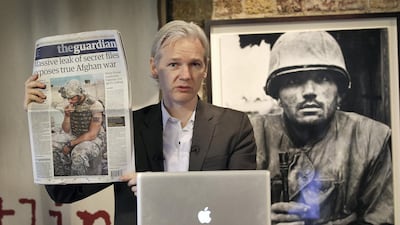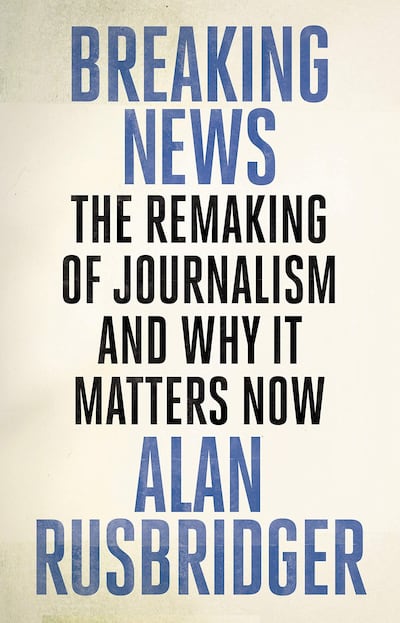Alan Rusbridger spent 20 years – 1995 to 2015 – as the editor-in-chief of The Guardian, but his 40-year career in the newspaper business began in 1976 in the offices of the significantly less prestigious Cambridge Evening News. Swapping Ezra Pound's Cantos for wedding reports and local football coverage, he joined the paper's 20-strong reporting staff a week after graduating from university, learning the trade from the ground up.
The first chapter of Breaking News: The Remaking of Journalism and Why It Matters Now opens with Rusbridger's account of his attempts to explain the workings of the pre-digital Cambridge Evening News to students today at the University of Oxford, where he now teaches. He draws a series of stick figures (SF) on the whiteboard. The reporter, SF one, types his story up on a manual typewriter onto "a sandwich of paper and carbon paper copies" – Rusbridger is also explaining all this antiquated machinery to his students as he goes – the top sheet he hands to the copy taster (SF 2), the carbon copy to the editor (SF 3). The copy taster then passes all the stories to the layout sub (SF 4), who designs the page and draws up a plan for the printers to follow, this is then passed on to the sub-editor (SF 5), and so on.
His description of the entire process takes up the best part of two pages. To describe all the steps would take up most of this review, so let me skip to the end: the delivery boy (SF 19) cycling round the streets of Cambridge posting the finished papers through letterboxes. Needless to say, the vast majority of what Rusbridger is describing now exists only in his and his colleagues’ memories. Back then, there was no talk of business models, ethics or technology. People got their news from the paper, and that was that. The papers held all the cards because they owned the printing presses, end of discussion.
When Rusbridger joined The Guardian three years later in 1979, he was joining a paper that had been around for 158 years and had barely altered in all that time. "Not much had changed about the way our journalism reached the readers in a hundred years or more," he explains. Yet what Rusbridger experienced during his time at the helm were a series of seismic shifts, the magnitude of which completely shook the industry.
Breaking News tells the story of the digitisation of journalism as seen from the front lines. This communication revolution hasn't simply changed how news is reported and consumed, but, more worryingly, how it's generated and by whom. Today's world is one in which falsehood and bias often trump truth and objectivity. It's a world in which anyone with a social media account can bring "news" to the masses. No wonder Rusbridger's students found the old model he was describing so hard to comprehend. Breaking News is a history of The Guardian under Rusbridger, and by extension, that of Fleet Street more generally, and much of it is absolutely fascinating. To read it is to see The Guardian we recognise come into focus – it's a story of the paper embracing what Rusbridger calls "open journalism".
In brief, one of the first steps down the latter's path was the creation of the role of Reader's Editor in the late 1990s. Even before the advent of social media, Rusbridger and his team recognised that the old model of centralised control wasn't going to last: "Journalism was not an infallible method guaranteed to result in something we would proclaim as The Truth – but a more flawed, tentative, iterative and interactive way of getting towards something truthful." This was later followed by "Comment is Free", which was launched in 2006. Meanwhile, realising that online coverage was journalism's future, "Guardian Unlimited," the paper's first digital iteration, arrived in 1999. Early discussions between Rusbridger and his staff led to musings that the paper's future might be as a print at home model. The delivery mechanism was off – they hadn't accounted for smartphones and tablets – but in principle, they weren't wrong. They also expanded their reach globally, of course. Guardian US was launched in 2011, which was followed two years later by Guardian Australia.
Rusbridger uses accounts of specific stories along the way to illustrate changes implemented or demands met. Some of these are quieter in tone, but others are already notorious: the Edward Snowden revelations, the News International phone-hacking scandal and the resultant Leveson Inquiry, Julian Assange and WikiLeaks, and the Keep it in the Ground campaign. The result is cumulative: an impassioned rallying cry in the defence of quality journalism, by means of a host of high-profile examples. Not that Rusbridger has all the answers. The title suggests something of a manifesto, but in actual fact he poses many more questions that he’s able to answer. Can we hope that sanity will prevail and the public will turn against opinion and bias and come back to the idea of impartial old-fashioned news? Or will demand continue for a model that welcomes the public’s participation? Either way, funding it while also believing in the idea of free media will continue to present a problem for his successors.
___________________________
Read more:
Lebanese author Elias Khoury: ‘I feel that we are beyond despair’
Pakistan storyteller Mohammed Hanif soars to greater heights
Sharjah International Book Fair announces 2018 line-up
___________________________


